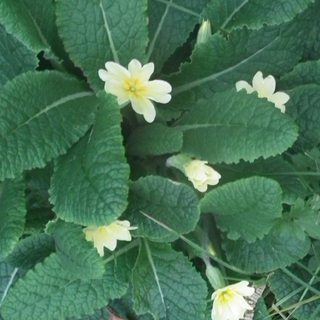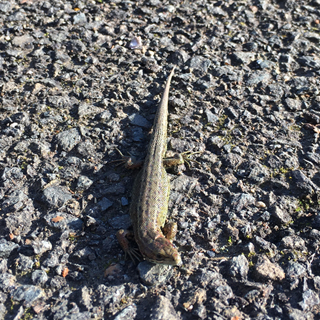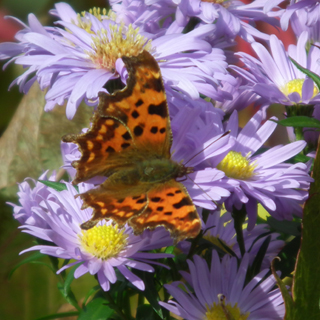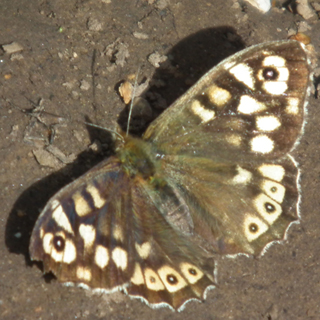 On the Roseland everything is growing or on the move and fresh air and lighter evenings beckon us outside. There we can celebrate signs of Spring. Blossom of hazel and blackthorn punctuate the landscape and trees are bursting into leaf. Primroses, celandine, wood anemone and wild garlic are scattered on banks and verges and woodland floors.
On the Roseland everything is growing or on the move and fresh air and lighter evenings beckon us outside. There we can celebrate signs of Spring. Blossom of hazel and blackthorn punctuate the landscape and trees are bursting into leaf. Primroses, celandine, wood anemone and wild garlic are scattered on banks and verges and woodland floors.
Small signs of life can now be discovered. The first solitary bumblebees, usually queens, seek nectar on these emerging flowers and tree blossom. The warmth wakens butterflies from their over-wintering shelters, often from garden sheds or farm buildings. One of the first to be seen is the stunning large yellow brimstone, usually near woodland clearings and edges seeking buckthorn, and along the coastal path hedges speckled wood butterflies dance. Small tortoiseshell, peacocks and, increasingly in gardens, commas can also be seen. A true sign of Spring is the appearance of male orange tip butterflies as they metamorphosis from being pupa chrysalides each March.
 Ponds attract croaking frogs and toads to spawn, and on warm days male adders might be found basking on rocks; or common lizards darting if disturbed from lazing on stone walls. You might see mad March hares charging around open grassy fields, now a very rare sight on the Roseland.
Ponds attract croaking frogs and toads to spawn, and on warm days male adders might be found basking on rocks; or common lizards darting if disturbed from lazing on stone walls. You might see mad March hares charging around open grassy fields, now a very rare sight on the Roseland.
In the air there will be insects, so important for pollination, and occasional bats already feeding on them at dusk. Also you will hear birds establishing territory and attracting mates by singing, whether they are skylark dots high in the sky, seabirds discordantly calling on cliff ledges on the Gull Rock or a cacophony of rooks in their large sociable colonies already feeding youngsters in Ruan Lanihorne, Tregony or Veryan, but best of all for me is the gorgeous melodic song, often repeated, of the song thrush singing from its favourite prominent vantage point.
 For this is the month when Spring officially starts, for meteorologists on the March 1st, but for traditionalists on March 21st, the Equinox, the date when the hours of daylight match the hours of darkness exactly!
For this is the month when Spring officially starts, for meteorologists on the March 1st, but for traditionalists on March 21st, the Equinox, the date when the hours of daylight match the hours of darkness exactly!
Beyond that date and up to June 21st nights grow ever shorter and daylight lengthens, temperatures continue to rise, warming the soil, water and the air; and these are the major factors in awakening the natural world from dormancy and hibernation.
Share your sightings with the Environmental Records Centre for Cornwall and the Isles of Scilly (ERCCIS)
ERCCIS encourages anyone to submit wildlife records, whatever your experience and no matter how common or widespread the species. Your records will help improve our understanding of the natural history of Cornwall and the Isles of Scilly, as well as to be used in decision-making, education, research and other public benefit purposes.
Upcoming Wild Roseland Walks and Talks – dates for your diary
Note that all events are free but a small donation of £3 would be welcomed.
Wednesday 20th March – Mammals of Cornwall
 I am delighted to tell you that our next evening event is on the wild Mammals of Cornwall and will be presented by Dave Groves who is chair of the Cornwall Mammals Group at the Cornwall Wildlife Trust. He has a specific interest in otters and hedgehogs which Wild Roseland propose to survey later in the year. The presentation will take place in Ruan Lanihorne Reading Room at 7.00pm on the 20th of March where you will be made most welcome. Admission by donation.
I am delighted to tell you that our next evening event is on the wild Mammals of Cornwall and will be presented by Dave Groves who is chair of the Cornwall Mammals Group at the Cornwall Wildlife Trust. He has a specific interest in otters and hedgehogs which Wild Roseland propose to survey later in the year. The presentation will take place in Ruan Lanihorne Reading Room at 7.00pm on the 20th of March where you will be made most welcome. Admission by donation.
Tuesday 16th April – Barn Owl Boost survey
We are extremely fortunate to have as our speaker David Ramsden, OBE. founder and Chair of the Barn Owl Trust who is a national authority on the species, discussing the Barn Owl Boost survey. Tuesday 16th April, 7pm at Gerrans Memorial Hall.
Saturday 27th – Sunday 28th April Photographic Exhibition
There will be another Photographic Exhibition, sponsored by the Roseland Festival. Details can be found in the March Roseland Magazine, Wild Roseland online and the Wild Roseland Facebook page. Deadline for submitting photos will be 20 April 2019.
Contributors:
Article by David Hall. Images by David Hall, Tara Robinson
Edited by Tara Robinson.
Wild Roseland is a group of volunteers who care passionately about looking after the nature and landscape of the Roseland peninsula in south Cornwall. Through a number of initiatives and projects, the aim is to inspire and enhance the conservation of this special place for all.
References and links
Environmental Records Centre for Cornwall and the Isles of Scilly. www.erccis.org.uk
The Woodland Trust. www.woodlandtrust.org.uk
The RSPB. www.rspb.org.uk
The Butterfly Conservation Trust. https://butterfly-conservation.org
The Butterflies of Britain and Ireland. Jeremy Thomas and Richard Lewington. British Wildlife Publishing ISBN 978-0-9564902
Image credits:
Comma butterfly, David Hall
Primrose, David Hall
Speckled Wood butterfly, David Hall
Common lizard, Tara Robinson
